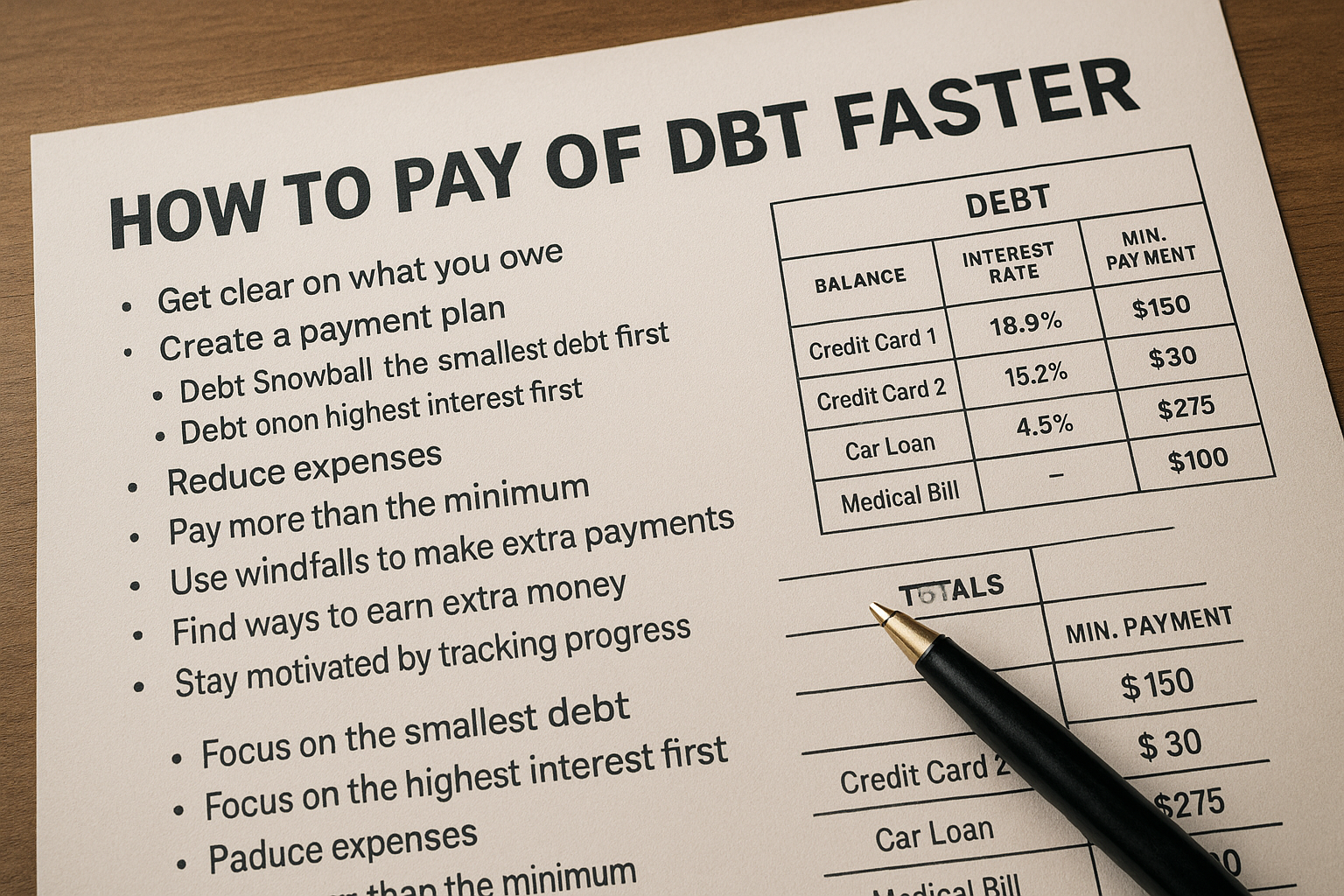Why Paying Off Debt Without Earning More Is Possible
Many people believe the only way to pay off debt quickly is to increase income. While earning more certainly helps, it’s not the only solution. With a focused plan, smart budgeting, and intentional habits, you can make real progress toward becoming debt-free — even on your current income.
The key lies in prioritizing, optimizing, and creating momentum. Let’s explore how to do it.
Get Clear on What You Owe
Before creating a strategy, you need to understand the full picture of your debt.
Make a list that includes:
- The creditor or lender’s name
- Total balance owed
- Minimum monthly payment
- Interest rate
- Due dates
Having this information in one place allows you to create a plan and track your progress. It also helps eliminate the stress that comes from uncertainty.
Create a Bare-Bones Budget
A temporary “bare-bones” budget focuses only on essential expenses like rent, food, utilities, and transportation. This helps free up more money to put toward your debt.
Here’s how to do it:
- Eliminate unnecessary subscriptions
- Cut back on entertainment and dining out
- Delay non-urgent purchases
- Look for areas where you overspend regularly
Even if you only apply this for 3–6 months, the extra money you free up can make a big dent in your debt.
Use the Debt Snowball or Debt Avalanche Method
These two popular methods help you pay off debt faster by organizing how you apply your payments.
Debt Snowball
- Focus on the smallest debt first
- Pay minimums on all others
- Once the smallest is paid off, roll that payment into the next smallest
This method creates motivation and momentum.
Debt Avalanche
- Focus on the debt with the highest interest rate first
- Pay minimums on all others
- Roll payments into the next highest interest debt
This method saves the most money in the long run.
Choose the one that fits your personality best — the important part is consistency.
Automate Your Payments
Set up automatic payments for at least the minimum amount due on each debt. This ensures you never miss a payment, which can lead to late fees and damage to your credit score.
Whenever possible, automate additional payments toward your target debt. Treat them like any other bill — non-negotiable.
Use Found Money Wisely
Even without getting a raise or new job, you may encounter small financial “wins” throughout the year:
- Tax refunds
- Cash gifts
- Rebates or refunds
- Credit card rewards (used wisely)
Instead of spending them, use these windfalls as lump-sum payments toward your debt. It’s money you weren’t counting on — put it to work for your financial freedom.
Reduce Interest Rates
Paying down debt isn’t just about the principal. High interest can keep you stuck for years. Try these strategies:
- Call your credit card company to ask for a lower interest rate
- Consider a balance transfer with a 0% APR promotion
- Look into debt consolidation with a lower-rate personal loan
Even a small reduction in interest can save you hundreds or thousands over time.
Say No — Even to Good Things
One of the biggest challenges of paying off debt is learning to delay gratification. You may need to say no to:
- A vacation this year
- Upgrading your phone
- Going to events that cost money
- Expensive gifts
This doesn’t mean living a joyless life — it means being intentional. Remember, it’s temporary. Once you’re debt-free, you’ll have much more flexibility.
Track Every Dollar
When you’re trying to pay off debt fast without extra income, every dollar counts. Use a budgeting app or spreadsheet to track:
- What you earn
- What you spend
- What you save or pay toward debt
The more aware you are of your money, the better your decisions will be.
Sell Unused Items
Look around your home — you might be sitting on hundreds of dollars in unused items. Sell:
- Electronics
- Clothing
- Books
- Furniture
- Kitchen gadgets
Use Facebook Marketplace, eBay, or local resale apps. Every bit helps chip away at your debt.
Use Cash for Daily Spending
When you pay with a card, it’s easy to lose track. Try switching to cash for categories like groceries, entertainment, or personal spending. Once the cash is gone, you stop spending. This old-school method is still one of the best ways to stay on budget.
Focus on Progress, Not Perfection
You might miss a payment or have an unexpected expense that throws you off. That’s okay. The key is to keep going.
Celebrate small wins like:
- Paying off a credit card
- Sticking to your budget for a month
- Hitting a milestone in total debt paid
Progress is progress. Each step forward builds momentum.
Becoming Debt-Free Is About Choice, Not Income
You don’t need to wait for a raise or a new job to start changing your financial future. By making intentional choices with the money you already have, you can pay off debt faster than you think.
It requires discipline, planning, and sacrifice — but it’s absolutely possible. And once you’re free from debt, you’ll have more freedom, peace of mind, and power to make choices for your future.
